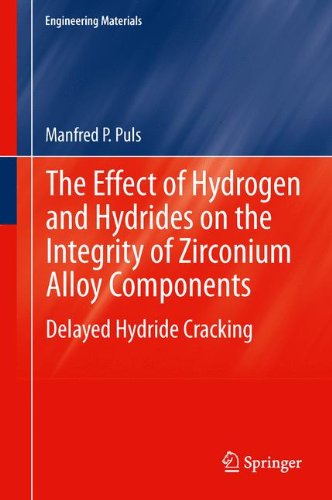

Most ebook files are in PDF format, so you can easily read them using various software such as Foxit Reader or directly on the Google Chrome browser.
Some ebook files are released by publishers in other formats such as .awz, .mobi, .epub, .fb2, etc. You may need to install specific software to read these formats on mobile/PC, such as Calibre.
Please read the tutorial at this link: https://ebookbell.com/faq
We offer FREE conversion to the popular formats you request; however, this may take some time. Therefore, right after payment, please email us, and we will try to provide the service as quickly as possible.
For some exceptional file formats or broken links (if any), please refrain from opening any disputes. Instead, email us first, and we will try to assist within a maximum of 6 hours.
EbookBell Team

4.3
58 reviewsBy drawing together the current theoretical and experimental understanding of the phenomena of delayed hydride cracking (DHC) in zirconium alloys, The Effect of Hydrogen and Hydrides on the Integrity of Zirconium Alloy Components: Delayed Hydride Cracking provides a detailed explanation focusing on the properties of hydrogen and hydrides in these alloys. Whilst the emphasis lies on zirconium alloys, the combination of both the empirical and mechanistic approaches creates a solid understanding that can also be applied to other hydride forming metals.
This up-to-date reference focuses on documented research surrounding DHC, including current methodologies for design and assessment of the results of periodic in-service inspections of pressure tubes in nuclear reactors. Emphasis is placed on showing how our understanding of DHC is supported by progress in general understanding of such broad fields as the study of hysteresis associated with first order phase transformations, phase relationships in coherent crystalline metallic solids, the physics of point and line defects, diffusion of substitutional and interstitial atoms in crystalline solids, and continuum fracture and solid mechanics. Furthermore, an account of current methodologies is given illustrating how such understanding of hydrogen, hydrides and DHC in zirconium alloys underpins these methodologies for assessments of real life cases in the Canadian nuclear industry.
The all-encompassing approach makes The Effect of Hydrogen and Hydrides on the Integrity of Zirconium Alloy Component: Delayed Hydride Cracking an ideal reference source for students, researchers and industry professionals alike.